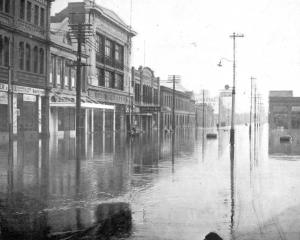Riverton mayor Theophilus Daniel couldn't have made himself more plain in his poster advertising a public meeting on July 4, 1881.
‘‘The Chinese Meeting'' the poster screamed in huge letters, while in smaller print was the nub of the matter: ‘‘to consider the best means to adopt to check the influx of the Chinese''.
A handful of Chinese miners had arrived in Western Southland in the mid 1870s to work at Round Hill, about 20km from Riverton. By 1881 the village known as ‘‘Canton'' had sprung up, with 270 Chinese and 40 European miners in residence.
Riverton's population at that time was about 1200, including about 40 Chinese, most of whom operated grocery and fruit and vegetables shops (some allegedly with gambling outlets or brothels out the back).
As they were in other parts of New Zealand, Chinese miners were at first welcomed to Western Southland. But as their numbers grew, hostility grew, too.
According to newspaper reports of the day, the concerns were their ‘‘foreigness'' - a euphemism for their non-Christian beliefs - and their marrying or living with European women and producing ‘‘half-caste'' children.
In its lengthy report, the Western Star newspaper said the meeting was one of the largest held in the district for some time past.
Mr Daniel talked about the need to stop Chinese with smallpox and leprosy entering the colony, while another speaker suggested water be withheld from the Round Hill miners, making it impossible for them to work and forcing them to leave.
Mr S Taylor labelled the Chinese in derogatory terms - which the Western Star published - and blamed local people for encouraging them to settle by letting land or buildings to Chinese tenants.
Mr Riltone said the best thing to do was either to ‘‘pole-axe or poll tax'' them.
The latter would be the better plan as it would save the trouble of burying them which pole-axing would involve. (Laughter) He also suggested Parliament be petitioned to introduce an annual poll tax of £20 per person ‘‘to keep them out of the country''.
Mr Pattison moved a resolution that the Government ‘‘devise some means to restrict the influx of the Chinese''. Mr Munro seconded it and the motion was put and carried.
In 1881, the New Zealand Government passed the Chinese Immigrants Act which introduced a tax of £10 for new Chinese arrival and a restriction on passenger numbers - one Chinese per 10 tons of cargo.
In 1896 the ratio was reduced to one passenger per 200 tons of cargo and the poll tax was increased to £100.
After 1896, Chinese immigrants had to have a guarantor and the poll tax had to be paid in advance. The tax was waived after 1934 but not repealed until 1944.
In 2002 the Government officially apologised to the Chinese for the suffering caused by the poll tax.
Two years later $5 million was paid to the newly-established Chinese Poll Tax Heritage Fund to support and preserve Chinese New Zealand history, language and culture, and to raise awareness of the contribution of early Chinese settlers.
● Chinese poll tax information sourced from Te Ara Encylopedia of New Zealand












